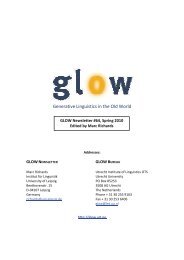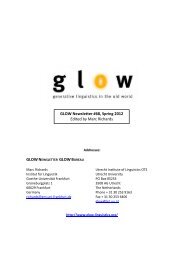Practical Information - Generative Linguistics in the Old World
Practical Information - Generative Linguistics in the Old World
Practical Information - Generative Linguistics in the Old World
Create successful ePaper yourself
Turn your PDF publications into a flip-book with our unique Google optimized e-Paper software.
Don’t scope your universal quantifier over negation!Mojmír Dočekal & Hana StrachoňováThere has been a lot of attention <strong>in</strong> <strong>the</strong> literature given to <strong>the</strong> factors which decide<strong>the</strong> relative scope of logical operators <strong>in</strong> <strong>the</strong> <strong>in</strong>terpretation of sentences. One of <strong>the</strong>crucial factors was claimed to be <strong>in</strong>formation structure (Jackendoff 1972, Hajičová 1975,Bür<strong>in</strong>g 1997, a.o.). One of <strong>the</strong> most important cases discussed <strong>in</strong> <strong>the</strong> literature is <strong>the</strong>scopal <strong>in</strong>terpretation of negative sentence conta<strong>in</strong><strong>in</strong>g universal quantifier which is assumedto be disambiguated by <strong>in</strong>tonation pattern <strong>in</strong> English and German even by Kadmon(2001). We present an argument that <strong>the</strong> apparent wide scope of <strong>the</strong> universal quantifierover negation is a result of scope illusion as argued <strong>in</strong>dependently for def<strong>in</strong>ite NPs andnegation <strong>in</strong> Beck (2001). This opens a possibility that <strong>the</strong> scope of universal quantifieris always below negation. The crucial evidence comes from an extensive corpus studyof <strong>the</strong> <strong>in</strong>terpretation of Czech universal quantifier všechno ’all’ (2000 sentences from <strong>the</strong>SYN2010, representative corpus of contemporary Czech, was parsed; <strong>the</strong> relative scope ofnegation and ∀ for each sentence was decided by paraphras<strong>in</strong>g <strong>the</strong> sentence mean<strong>in</strong>g <strong>in</strong>to<strong>the</strong> sentence with unambiguous scope and judg<strong>in</strong>g <strong>the</strong> plausibility of such paraphrase).We found that 89 % of negated sentences with unmodified subject NP conta<strong>in</strong><strong>in</strong>g všechnois <strong>in</strong>terpreted with <strong>the</strong> relative scope ¬ > ∀ (1). The rema<strong>in</strong><strong>in</strong>g 11 % of unmodified subjectNP is <strong>in</strong>terpreted with <strong>the</strong> opposite scope. This holds irrespective of <strong>the</strong> l<strong>in</strong>earization– both S neg-V and neg-V S l<strong>in</strong>ear order show nearly <strong>the</strong> same percentage of relativescopes (notice that Czech is a language with relative free word order, <strong>the</strong> changes <strong>in</strong>l<strong>in</strong>earizatione were claimed to be l<strong>in</strong>ked to <strong>in</strong>formation structure by many, see Kučerová2012 a.o.). But surpris<strong>in</strong>gly <strong>the</strong> <strong>in</strong>terpretation totally reverses when we consider modifieduniversal subject NPs: 87 % of sentences is <strong>in</strong>terpreted with <strong>the</strong> scope ∀ > ¬ (2) and only13 % has <strong>the</strong> <strong>in</strong>terpretation with <strong>the</strong> opposite scope. We argue that <strong>the</strong> <strong>in</strong>terpretation∀ > ¬ is just illusion of scope similar to apparent wide scope of conjunction over negation<strong>in</strong> languages like Hungarian (Szabolcsi & Haddican, 2004).(1) a. Myslím, že všechny mrtvoly se ještěTh<strong>in</strong>k.1sg that all corpses SE still’I th<strong>in</strong>k that all corpses didn’t appear still.’b. Všichni pacienti si ale látkyAll patients SI though matters’All patients don’t develop antibody.’neobjevily.NEG-appear.3plnevytvářejí.NEG-develop.3pl(2) Všechny ty škody neměly j<strong>in</strong>ý účel než nadělat co nejvícall <strong>the</strong> damages NEG-have.3pl o<strong>the</strong>r purpose than make as muchhluku.noise’The purpose of all <strong>the</strong> damages was to make as much noise as possible.’Proposal: We argue that <strong>the</strong> fixed scope between universal quantifier and negation is<strong>the</strong> result of competition <strong>in</strong> grammar, namely reference set competition (Re<strong>in</strong>hart, 2006;Percus, 2006), see also block<strong>in</strong>g (Horn, 1989). The reason why <strong>the</strong> scope ∀ > ¬ is neverrealized by <strong>the</strong> sequence všechno . . . ne is that <strong>the</strong>re is a strictly simpler realization of<strong>the</strong> same semantic <strong>in</strong>formation, namely a s<strong>in</strong>gle lexical item žádný ’no’. We argue that<strong>the</strong> existence of this lexical item blocks <strong>the</strong> scope reversal structure. We argue fur<strong>the</strong>r,that <strong>the</strong> illusion of scope ∀ > ¬ <strong>in</strong> examples like (2) arises as <strong>the</strong> result of negationapplied to <strong>the</strong> def<strong>in</strong>ite (maximal) plurality, as <strong>in</strong>troduced <strong>in</strong> Beck (2001), and called1





